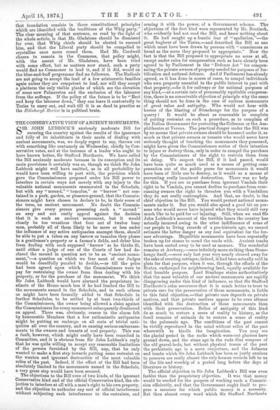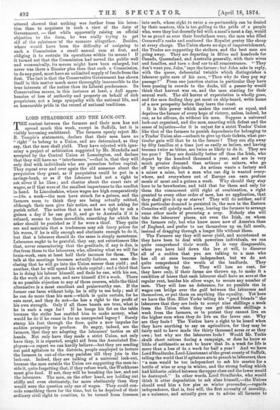THE CONSERVATIVE VIEW OF ANCIENT MONUMENTS.
SIR JOHN LUBBOCK'S anxiously moderate Bill for securing the country against the results of the ignorance and folly of its inhabitants in their mode of dealing with ancient monuments, was, we deeply regret to say, thrown out with something like contumely on Wednesday, chiefly by Con- servative votes, and at the instance of a leader who ought to have known better, Sir Stafford Northcote. We have called the Bill anxiously moderate because in its conception and its main provisions it certainly was so, though we think Sir John Lubbock might well have omitted, as in all probability, he would have been willing to part with, the provision which gave the Commissioners proposed under his Bill power to interfere in certain ways not merely with any injury to the valuable national monuments enumerated in the Schedule, but with any "mound," "tumulus," or "barrow" not con- tained in a park, garden, or pleasure-ground, that the Commis- sioners might have chosen to declare to be, in their sense of the term, an ancient monument. No doubt the Commis- sioners give every person possessing such a " mound" an easy and not costly appeal against the decision that it is such an ancient monument, but it would clearly be too vexatious that four out of twelve busy men, probably all of them likely to be more or less under the influence of any active antiquarian amongst them, should be able to put a taboo on any barrow or tumulus they please in a gentleman's property or a farmer's fields, and debar him from dealing with such supposed 'barrow' as he thinks et, until either a judge of one of the Courts of law had de- clared the mound in question not to be an "ancient monu- ment,"—a question on which we fear most of our Judges would be dreadfully puzzled to decide,—or till the price had been agreed upon which the Commissioners were to pay for restraining the owner from thus dealing with his property, or for the purchase of the monument. We think :Sir John Lubbock would have alarmed the proprietary in- stincts of the House much less if he had limited the Bill to the monuments named in the Schedule, and to such others as might have been formally added to that Schedule in further Schedules, to be settled by at least two-thirds of the Commissioners, the owner being allowed a claim against the Commissioners for every monument subsequently disallowed on appeal. There was, obviously, reason in the alarm felt by honourable Members that a few enthusiastic antiquaries might be putting an embargo on all sorts of trivial anti- quities all over the country, and so causing serious embarrass- ments to the owners and tenants of real property. This was a fault, however, which might easily have been remedied in Committee, and it is obvious from Sir John Lubbock's reply that he ,was quite willing to accept any reasonable limitations of the powers furnished by the Bill, nay, that he only wanted to make a first step towards putting some restraint on the wanton and ignorant destruction of the most valuable relics of the past. Indeed, if the effect of the Bill had been absolutely limited to the monuments named in the Schedule, a very great step would have been secured. The objections to the Bill were of two kinds, of the ignorant Conservative kind and of the official Conservative kind, the ob- jection to interfere at all with a man's right to his own property, and the objection to authorise any sort of official interference without subjecting such interference to the restraints, and arming it with the power, of a Government scheme. The objections of the first kind were represented by Mr. Bentinck, who evidently had not read the Bill, and knew nothing about it. He had caught up a frantic fear of "spoliation,"—the great bugbear of the Tories,—and described the Bill as one which must have been drawn by persons with "consciences as broad as the acres they proposed to appropriate." Now the fact is that the Bill proposed to appropriate no acres at all, except under rules for compensation such as have already been agreed to by Parliament in the "Defence Act" for compen- sating the private owners of property needed for purposes of for- tification and national defence. And if Parliament has already agreed, as it has done in scores of cases, to compel individuals wlio own property essential to the public interest to part with that property,—be it for railways or for national purposes of any kind,—at a certain rate of presumably equitable compensa- tion, there is no conceivable objection of principle why the same thing should not be done in the case of curious monuments of great value and antiquity. Who would not hear with horror of the blasting of Stonehenge for the purpose of a quarry ? It would be about as reasonable to complain of putting restraint on such a procedure, as to complain of the Italian Government for protecting the Coliseum or the Am- phitheatre at Verona. The practical danger under the Bill was by no means that private owners should be harassed under it, so much as that private owners or tenants who would never have seriously thought of touching the monuments they possessed, might have given the Commissioners notice of their intention to injure or destroy them, only in order to compel the purchase by the Commissioners of the right to restrain them from so doing. We suspect the Bill, if it had passed, would have been quite as much used as a means of getting com- pensation out of the public purse for monuments it would have been of little use to destroy, as it would as a means of preventing really imminent destruction. There was no help for this. If you are to purchase from ignorant Vandals their right to be Vandals, you cannot decline to purchase from over- cunning owners the right to threaten you with a Vandalism they do not really contemplate. And that, no doubt, is the chief objection to the Bill. You would protect national monu- ments under it. But you would also spend a good bit on per- sons who would never have injured what they would still very such like to be paid for not injuring. Still, when we read Sir John Lubbock's account of the terrible losses the country has actually incurred owing to the utter indifference of some of our people to living records of a pre-historic age, we cannot estimate the latter danger as any real equivalent for the for- mer advantage. Megalithic monuments have been repeatedly broken up for stones to mend the roads with. Ancient tombs have been carted away to be used as manure. The wonderful remains at Avebury,—once infinitely more striking than Stone- henge itself,—were only last year very nearly cleared away for the sake of erecting cottages; indeed, it had been actually sold in plots for that purpose, when it was, through the efforts of the Rector, exchanged for neighbouring land, equally available for that humble purpose. Lord Stanhope states authoritatively that the most valuable of our ancient monuments are rapidly disappearing under this kind of influence, so that Sir Stafford Northcote's calm assurance that it is much better to trust to private care for the preservation of these monuments, is liable to this fatal objection,—that private care depends on private motives, and that private motives appear to be even oftener- identified with the destruction of these monuments than with their preservation. Relics of antiquity of this kind, do as much to restore a sense of reality to history, as the fossil remains of animals do to restore a sense of reality to the palaaozoic age. The conditions of the past cannot be vividly reproduced in the mind without relics of the past wherewith to kindle the imagination. You may see the glacial period in the rocks which worn-out glaciers have ground down, and the stone age in the rude flint weapons of the old gravel-beds, but without physical traces of the past the prehistoric age is a mere conjecture, and the dolmens and tombs which Sir John Lubbock has been so justly anxious to preserve are really almost the only human records left to us of the life and worship of a period long before the days of literature or history.
The official objection to Sir John Lubbock's Bill was even feebler than the proprietary objection. It was that money would be needed for the purpose of working such a Commis- sion efficiently, and that the Government ought itself to pro- pose a measure for which public money is a necessity. But then almost every word which Sir Stafford Northcote uttered showed that nothing was further from his inten- tion than to acquiesce in such a view of the duty of Government, — that while apparently raising an official objection to the form, he was really trying to get rid of the substance of the measure altogether. Besides, where would have been the difficulty of assigning to such a Commission a small annual sum at first, and obliging it to restrain its operations within its means ? If it turned out that the Commission had served the public well and economically, its means might have been enlarged, but never was there a flimsier plea than that such a Commission, to do any good, must have an unlimited supply of funds from the first. The fact is that the Conservative Government has shown itself in this matter much more thoroughly inaccessible to the true interests of the nation than its Liberal predecessor. Its Conservatism means, in this instance at least, a dull appre- hension of loss of authority and property on behalf of rich proprietors, not a large sympathy with the national life, and an honourable pride in the record of national traditions.



































 Previous page
Previous page